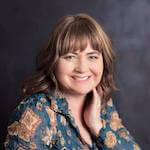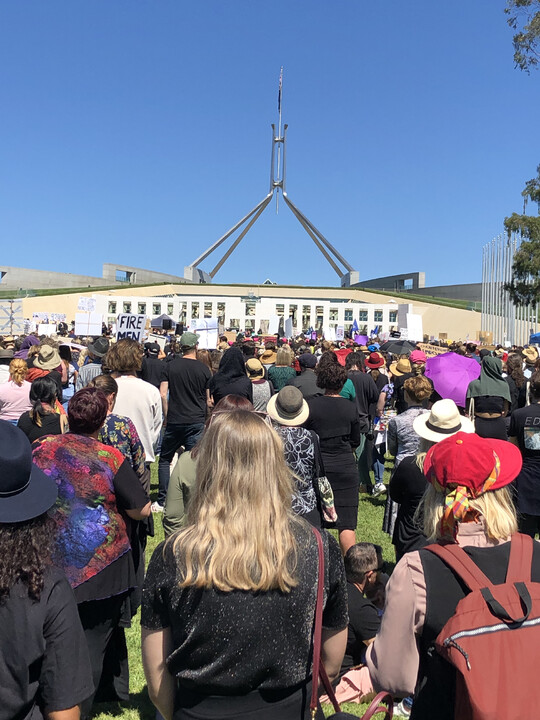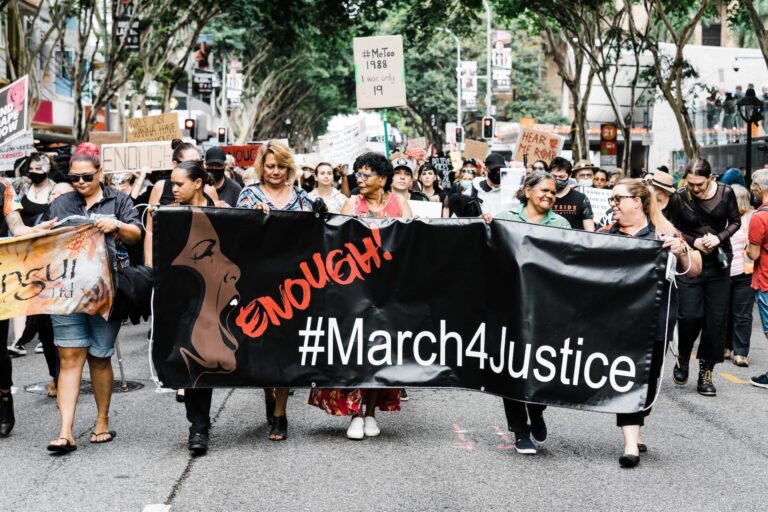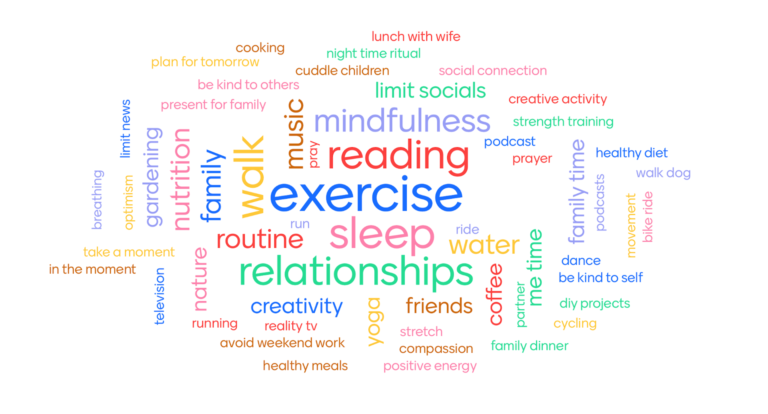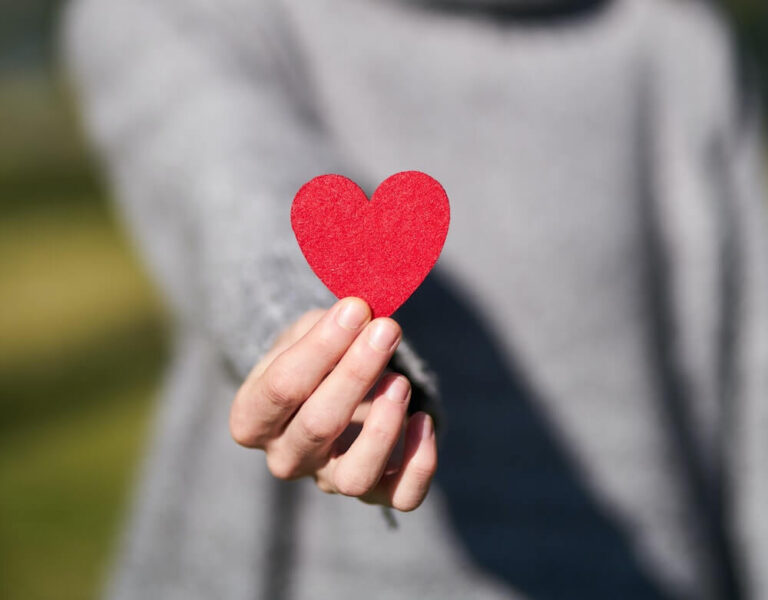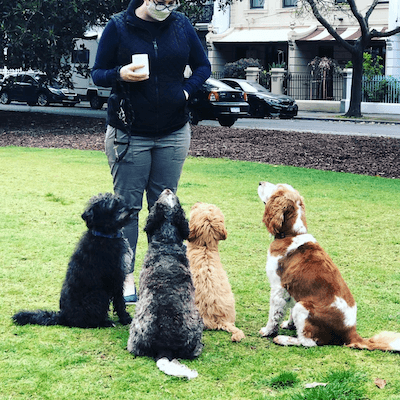Why saying ‘Not all Men’ is a Problem
Why saying ‘Not all Men’ is a Problem
I was eavesdropping on a discussion between my 16-year-old daughter and a group of her friends and by their tones, I could hear something interesting was going on: “That’s just such bullsh*t!”, said one of the boys. “I’m furious!”, said one of the girls. “Just such a boomer!”, said another.
I asked my daughter about it later. She explained to me that an adult leader had made some comments about gender-based events in Australia in recent weeks. Allegedly the leader deliberately emphasised the words SOME men, because it is only a small number of men who act this way. Whilst also praising Grace Tame’s brave work, the leader allegedly went on to emphasise that change cannot come about by demonising boys and men and that that while some men have mistreated women in the past, there has always been a number of women who have also not done the right thing to men.
I can see both sides: I completely get the teens’ anger at this, (in fact, it also made me angry). However, I also ‘get’ the intention that may lie behind comments like this. This person’s role is to keep young people safe and quell fears, to provide a balanced viewpoint. There may also be external pressures at play. Perhaps, however, the role of a leader is also to ‘read the room’; ask difficult questions; listen to responses; provide the facts; and, to facilitate (or have experts do so) hard and complex conversations. We can’t bullsh!t our young people – they are going through a pandemic and threats to democracy, they are wary and they are smart.
We can’t bullsh!t our young people – they are going through a pandemic and threats to democracy: they are wary, they question and they are smart.
[/et_pb_text][et_pb_text _builder_version=”4.10.7″ _module_preset=”default” hover_enabled=”0″ global_colors_info=”{}” sticky_enabled=”0″]
I found out the hard way why comments like ‘not all men’ are unhelpful: in the height of the #metoo movement, I was involved in a discussion where some men close to me told me they felt unsure of what to say for fear of saying the wrong thing. In response, I put up a supportive post calling out the ‘good men’ in my life. What followed was a barrage of ‘feedback’ – the worst of which labelled me an ‘apologist’, a ‘victim-blamer’ and a ‘panderer to the patriarchy’. (Wow SOME, not all, women can be each other’s own harshest critics!). As someone who’s called herself a feminist since the 1980s and worked in women’s leadership development for nearly twenty years, I was stung. However, they also had a point, and I decided that instead of licking my wounds, I’d use it as an opportunity to learn (and unlearn). I even sought out academics whose areas of expertise are gendered violence, women and sexual assault and gender and leadership. I emailed them and received generous reference lists and responses.
So, let’s cut to the chase: if you too are wondering, (as I did), why ‘not all men’ gets such angered responses – and really is so unhelpful – here is my very simplified take, (and I’ve also included some links for those curious to learn more).
At a very basic level, it boils down to few main things:
Firstly, we know this anyway. We ALL know that ‘not all men’ are sexual assailants. (At the same time, we don’t know which men ARE the sexual assailants, but we know it’s not all men). However, we also know that 1 in 6 women (17%) in Australia has experienced at least one sexual assault since the age of 15, (and 1 in 25 men have). 97% of perpetrators of all sexual assaults are male, and males aged 15-19 have the highest offender rates. Attitudes to sexual assault in Australia are also somewhat disturbing, for example, 19% of Australians aged 16 and over did not know that non-consensual sex in marriage is a crime (in lay terms, you can’t force your partner to have sex with you just because they are your partner), and 11% of Australians believe that if a woman does not report a sexual assault immediately, it probably didn’t happen, (despite that fact that false reports have been shown to be under 5% of all reported to police).*
We ALL know that ‘not all men’ are sexual assailants. However, we also know that 1 in 6 women (17%) in Australia has experienced at least one sexual assault since the age of 15 and that 97% of perpetrators of all sexual assaults are male.
Secondly, when we make a ‘not all men’ -style of comment, we are putting ‘everyone feeling comfortable’ over and above being honest about the facts, learning and having the difficult conversations that need to take place. It ignores the data (or suggests that it is insignificant) which can be invalidating of the experiences others have had, (remembering 1 in 6 women has experienced sexual assault in Australia). Some might argue that it privileges men’s comfort (‘don’t blame all boys’), others might suggest that it is about keeping everyone comfortable, (‘nothing to see here … it really isn’t that bad … most of you will be ok.’). Regardless, it changes and downplays a very serious topic: sexual harassment is common in our workplaces/communities/homes/schools, and, once again, 1 in 6 women experience sexual assault in Australia.
When we say ‘not all men’ we are putting ‘everyone feeling comfortable’ over and above being honest, learning and having the difficult conversations that need to take place.
This is the part where I could go to my very easy go-to place of angry, middle-aged feminista and share with you the multiple stories from my friends and women I have worked with who have lost their virginity at early ages to sibling’s friends, or step-fathers, or school teachers. The many who were pressured into sex before they were ready. Or plied with drinks (some spiked) by people they thought were friends, or work colleagues. Or being ridiculed and humiliated at work by a hurt boss whose advances had been refused. Or having their husband force them into sex in a hospital hours after they had given birth… but I will spare you the discomfort of those details … this time.
it changes and downplays a very serious topic: sexual harassment is rampant in our workplaces/communities/homes/schools
Reading this (and thank you if you have), you might draw the common conclusion that this really is just all too hard and you’re going to keep your own counsel on this one. That is a fair call – and your prerogative. However, I’d like to encourage you to think a little more.
Allow me to share my ‘story’ with you. For many years I felt this was a very insignificant story. I was even ashamed of it. So I kept quiet thinking I had nothing to contribute. But now I think it’s important to share because it’s important to model what is possible and what we are all deserving of.
Don’t we all deserve to have a life where gender does not play into whether you are treated respectfully; more likely or not to be sexually assaulted; to earn the same wage as others; or, to have a voice in the halls of power?
Here is my story:
I am one of the lucky ones. I have never been sexually assaulted. I grew up surrounded by a big, bustling, mostly happy family of men and women (eight out of nine cousins on my maternal side are female), all of whom provided me with positive role models in various ways. My grandfather, my Dad, my Uncles and my husband were/are all men who had strong mothers and sisters in their lives, and generally healthy relationships, respect for, love of, and involvement with their wives and children’s lives. I could write pages with countless examples of how my individual family members are good humans, but instead, I’ll take you straight to the conclusion I reached (largely unconsciously): isn’t this just normal and even if it’s not, doesn’t EVERYONE deserve this? Don’t we all deserve to be surrounded by people and have a life where gender does not play into whether you are treated respectfully; more likely or not to be sexually assaulted; to earn the same wage as others; or, to have a voice in the halls of power?
This is simplistic, I know. However, I have been asked multiple times in private messages and secret conversations if I have a ‘story’ to share because I have so much passion about this topic. The answer now is yes, I do have a story to share. It’s the one above and should be what every human can have and yes, I’m going to single out, it’s what every WOMAN should be able to have. It’s what I want my daughter to have. After the #March4Justice in Canberra last week, my daughter reflected on how supported and validated she felt having her 75-year-old Grandpa, her boyfriend march and her Dad march in ally-ship, and having women and men of multiple generations together at the rally.
We are constantly reminded how lucky we are to live in Australia – and we are. But whilst 51% of the population is ‘less lucky’ purely based on gender, we have a long way to go, a lot of conversations to have and a lot of work to do.
Data for statements in point one are here – https://www.aihw.gov.au/getmedia/0375553f-0395-46cc-9574-d54c74fa601a/aihw-fdv-5.pdf.aspx?inline=true-
A link to XY online – https://xyonline.net/content/engaging-men-violence-prevention-key-resources#NotAllMen Curated by Associate Professor, Dr Michael Flood, QUT, a sociologist who achieved his doctorate in gender and sexuality studies at ANU.
ABS stats here – https://www.abs.gov.au/statistics/people/crime-and-justice/personal-safety-australia/2016
